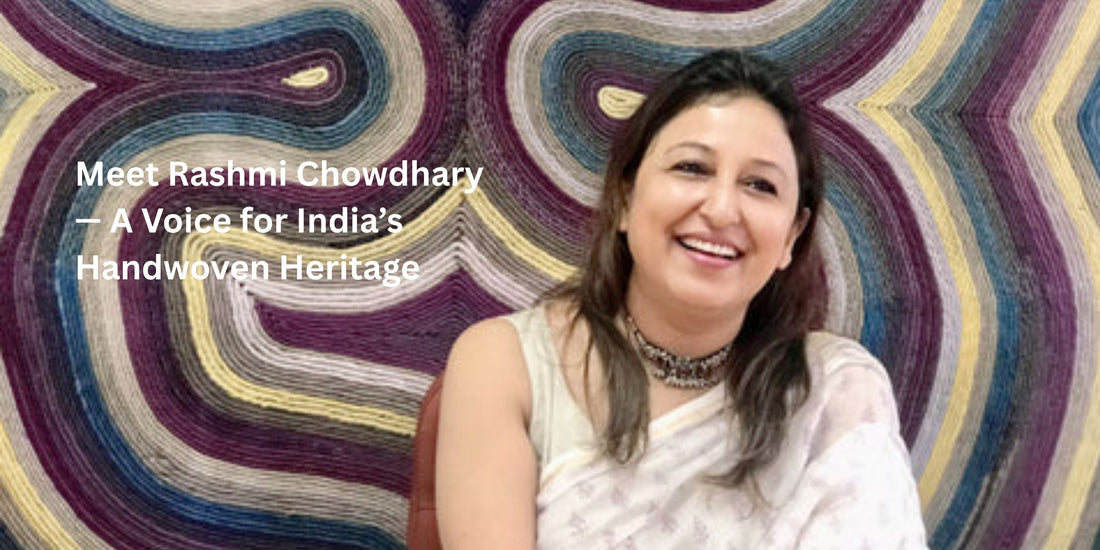
Rashmi Chowdhary — A Voice for India’s Handwoven Heritage
Share
Meet Rashmi Maskara Chowdhary—Founder of Sari Ki Almari and a proud 1991 graduate of the National Institute of Fashion Technology, Delhi. With a foundation deeply rooted in design and tradition, Rashmi has spent decades celebrating what many overlook: the unmatched artistry of India’s handloom weavers.
That’s why her words of appreciation for Daroonjinish carry such meaning.
“Hi, everyone. I'm here to tell you about this fantastic brand called Daroonjinish. The name is Daroon—that means really good. And it's about uplifting crafts and making them modern so we can use them in our daily lives. That’s what Daroonjinish does with such great expertise. Poonam, the founder, goes inside the craft people's villages and homes to find beautiful products that we can use. She changes the colors, the slight designs, and makes it really happening and cool. I wish Poonam the best for her journey as a crafter. I'm so happy she joined us at our Rotary fundraiser, Kolkata Kettle. The whole concept is just lovely, just like her—and I wish her only the best.”
Coming from someone who has spent her life working with weavers and celebrating handmade stories, Rashmi’s words reflect genuine recognition. What she sees in Daroonjinish is a shared commitment—uplifting traditional crafts, not by locking them in the past, but by reimagining them for modern, mindful living.
Both Sari Ki Almari and Daroonjinish stand as reminders that heritage is not static—it evolves. It can be styled, shaped, and stitched into today’s world without losing its soul.
When a seasoned designer like Rashmi offers her support, it’s more than admiration—it’s a nod to a shared mission: to honor, empower, and amplify the voices of India’s artisans.
A proud alumna of the National Institute of Fashion Technology, Delhi (1991), Rashmi’s journey began not just in fashion, but in philosophy. As a student, she wasn’t simply sketching silhouettes—she was already dreaming of ways to blend tradition with modernity. Winning the final award for her innovative use of traditional craft wasn’t just a milestone; it was a quiet vow to India’s textile heritage.
Years later, that vow took the shape of Sari Ki Almari—a soulful handwoven saree collective born in 2017, born from both nostalgia and responsibility. Rashmi had observed a painful truth: while the traditional sari was slipping into corners of wardrobes, it was also slowly disappearing from looms. The craft was suffering, the artisans silenced by synthetic trends and market apathy.
But she saw a silver lining—an emerging tribe of women who didn’t see saris as “ethnic obligations,” but as conscious choices. To them, saris weren’t about tradition alone; they were about voice, identity, and compassion. For them, Sari Ki Almari curated an edit of heritage weaves—from Bengal’s mystical threads to Madhya Pradesh’s elegant Chanderis, and Varanasi’s opulent Banarasis—each selected not just for style, but for story.
This is the lens through which Rashmi sees the world: through warp and weft, through hands and hearts.
So when someone like her speaks of Daroonjinish, it isn’t flattery—it’s a resonance.
It was a serendipitous meeting during a Rotary fundraiser event—Kolkata Kettle—that brought Rashmi and Daroonjinish together. What followed was more than collaboration. It was kindred recognition: two women-led brands rooted in ethics, aesthetics, and empathy.
What Rashmi saw in Daroonjinish was not just a label—but a movement. A movement that doesn’t sell products—it retells forgotten legacies. Much like Sari Ki Almari, Daroonjinish refuses to let the rural artisan remain invisible. It makes them heard—in the hues of sabai grass, the geometry of handmade bags, and the joy of purposeful gifting.
As Rashmi beautifully said:
“It’s time we acknowledged the skill of weavers and artisans who pour their hearts into each creation. Daroonjinish is doing just that—and with such grace.”
In a world often dominated by algorithms and mass production, Rashmi and Punam remind us that craft is not a commodity—it’s culture. And preserving it is not just a business strategy—it’s a beautiful rebellion.
Here’s to more such threads of trust. To Sari Ki Almari. To Daroonjinish. To women who weave change—one handcrafted piece at a time.
